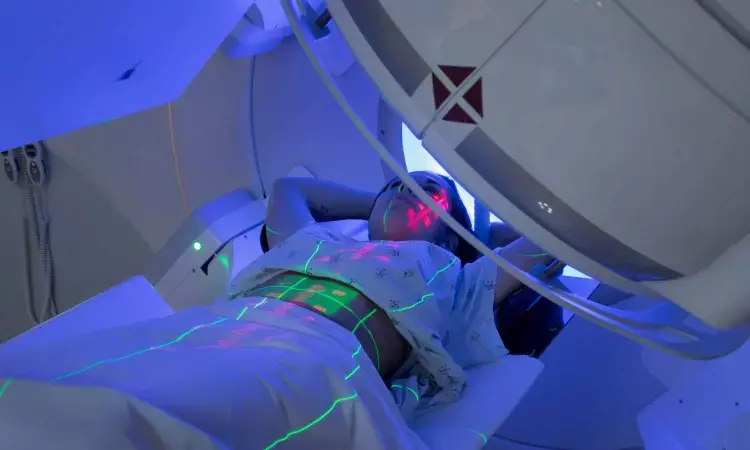- Home
- Medical news & Guidelines
- Anesthesiology
- Cardiology and CTVS
- Critical Care
- Dentistry
- Dermatology
- Diabetes and Endocrinology
- ENT
- Gastroenterology
- Medicine
- Nephrology
- Neurology
- Obstretics-Gynaecology
- Oncology
- Ophthalmology
- Orthopaedics
- Pediatrics-Neonatology
- Psychiatry
- Pulmonology
- Radiology
- Surgery
- Urology
- Laboratory Medicine
- Diet
- Nursing
- Paramedical
- Physiotherapy
- Health news
- Fact Check
- Bone Health Fact Check
- Brain Health Fact Check
- Cancer Related Fact Check
- Child Care Fact Check
- Dental and oral health fact check
- Diabetes and metabolic health fact check
- Diet and Nutrition Fact Check
- Eye and ENT Care Fact Check
- Fitness fact check
- Gut health fact check
- Heart health fact check
- Kidney health fact check
- Medical education fact check
- Men's health fact check
- Respiratory fact check
- Skin and hair care fact check
- Vaccine and Immunization fact check
- Women's health fact check
- AYUSH
- State News
- Andaman and Nicobar Islands
- Andhra Pradesh
- Arunachal Pradesh
- Assam
- Bihar
- Chandigarh
- Chattisgarh
- Dadra and Nagar Haveli
- Daman and Diu
- Delhi
- Goa
- Gujarat
- Haryana
- Himachal Pradesh
- Jammu & Kashmir
- Jharkhand
- Karnataka
- Kerala
- Ladakh
- Lakshadweep
- Madhya Pradesh
- Maharashtra
- Manipur
- Meghalaya
- Mizoram
- Nagaland
- Odisha
- Puducherry
- Punjab
- Rajasthan
- Sikkim
- Tamil Nadu
- Telangana
- Tripura
- Uttar Pradesh
- Uttrakhand
- West Bengal
- Medical Education
- Industry
Novel PET radiotracer promising for detecting several cancers, holds potential for new targeted radionuclide therapy

China: A new radiotracer, 68Ga-FAP-2286, is promising for safe cancer diagnosis, staging, and restaging, a recent study published in The Journal of Nuclear Medicine has shown.
The study revealed that 68Ga-FAP-2286 detected 100 percent of primary tumours across multiple cancer types compared to 18F-FDG, which identified only 80 percent. 68Ga-FAP-2286 was also more effective in detecting lymph node metastases and distant metastases.
68Ga-FAP-2286 has been found to be more effective than the most commonly used nuclear medicine cancer imaging radiotracer, 18F-FDG.
18F-FDG, which measures glucose metabolism, is used extensively in nuclear medicine cancer imaging. Recent advances have shown that fibroblast activation protein (FAP), which is overexpressed in cancer cells, maybe a better target for imaging solid tumours.
“In this study, we aimed to investigate the diagnostic accuracy of 68Ga-FAP-2286-a radionuclide developed to target FAP-for detecting the primary and metastatic lesions in patients with various types of cancer,” said Haojun Chen, MD, PhD, nuclear medicine physician at the First Affiliated Hospital of Xiamen University in Xiamen, China.
Sixty-four patients with 14 types of cancer were included in the study. Sixty-three patients underwent paired 68Ga-FAP-2286 and 18F-FDG PET/CT, and 19 patients underwent paired 68Ga-FAP-2286 and 68Ga-FAP-46 (another 68Ga-radiolabeled variant). Results were evaluated and compared.
68Ga-FAP-2286 PET yielded a higher radiotracer uptake, tumor-to-background ratio and tumor detectability than 18F-FDG. In addition, 68Ga-FAP-2286 and 68Ga-FAPI-46 yielded comparable clinical results.
“The novel radionuclide 68Ga-FAP-2286 is shown to be a promising FAP-inhibitor derivative for safe cancer diagnosis, staging and restaging,” stated Chen. “Specifically, it may be a better alternative for diagnosing the cancer types that exhibit low-to-moderate uptake of 18F-FDG, such as head and neck, gastric, pancreatic and liver cancer.”
Chen also noted that FAP-2286 not only exhibits promising characteristics for diagnosis, but also for cancer treatment. “Due to its molecular makeup, FAP-2286 can be paired with 177Lu to create a new radiopharmaceutical therapy,” he said. “177Lu-FAP 2286 has the potential to offer potent and selective FAP binding, which could lead substantial therapeutic efficacy for cancer patients in the future.”
Reference:
Yizhen Pang, Liang Zhao, Tinghua Meng, Weizhi Xu, Qin Lin, Hua Wu, Jingjing Zhang, Xiaoyuan Chen, Long Sun and Haojun Chen Journal of Nuclear Medicine March 2023, 64 (3) 386-394; DOI: https://doi.org/10.2967/jnumed.122.264544.
Dr Kamal Kant Kohli-MBBS, DTCD- a chest specialist with more than 30 years of practice and a flair for writing clinical articles, Dr Kamal Kant Kohli joined Medical Dialogues as a Chief Editor of Medical News. Besides writing articles, as an editor, he proofreads and verifies all the medical content published on Medical Dialogues including those coming from journals, studies,medical conferences,guidelines etc. Email: drkohli@medicaldialogues.in. Contact no. 011-43720751


